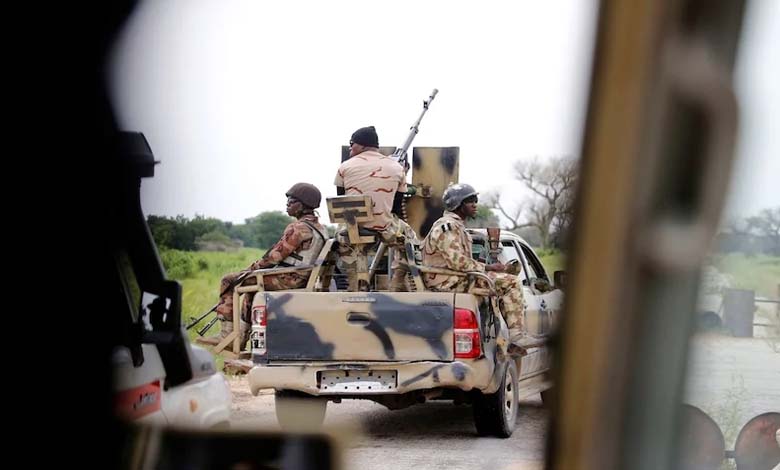Nigeria and the repentant terrorists… a journey back from extremism

A small black dot moves across the sky over Bama, Nigeria, before the buzzing of an aircraft engine becomes audible, growing louder until it overwhelms every surrounding sound.
In this city in the northeast of the country, about 50 kilometers from Maiduguri, the capital of Borno State, Kashala pauses mid-movement, holding a hammer. Commenting quietly on the noise, he says, “It’s a helicopter”, then sighs and bends down again to craft a wooden door frame.
-
Facing Boko Haram: Why is the Nigerian Army Struggling?
-
Black Monday in Nigeria: Stay Home or Risk Death
Kashala is one of the tens of thousands of former fighters of Boko Haram and the Islamic State in West Africa. Today, he has chosen the path of “repentance”, as it is known locally, embarking on the difficult journey of reintegration after years of radicalization and violence.
According to Radio France Internationale, Nigeria relies on transitional justice mechanisms to encourage the return of repentant fighters to communities where the victims of extremism often live.
The man recounts a period of his life in which he says he was forced to join Boko Haram. “We were told it was for the common good,” he explains.
-
Alarming Security Deterioration in Nigeria: Civilians Trapped Between Boko Haram and ISIS
-
“Borno Attack” in Nigeria: A Bloody Confrontation and Heavy Losses for Boko Haram
In 2020, this thin man in his thirties left the extremist group. He says: “I was a fighter”, adding: “At the time, we had no choice. We were forced to work with them, otherwise death awaited us”.
After his indoctrination, Kashala became a killing machine, having joined the organization in 2014 in northeastern Nigeria.
He admits to committing acts of torture and bloodshed on the orders of Boko Haram commanders, including its leader Abubakar Shekau, who was killed in 2021.
Among the places where he says he carried out abuses are Gwoza, Damboa, Konduga, Bama and Chibok.
-
The Emergence of a New Jihadist Group Exacerbates Nigeria’s Security Woes
-
Motorbike raid: 22 villagers killed in western Niger
“I did it willingly, because we were told it was good. Our leaders always repeated that we would go to paradise when we died,” he says.
Today, he expresses regret only in private, out of fear of retaliation. He now lives in Bama with his partner Bintugana, a former Boko Haram captive whom he married in the Sambisa forest, and their two children born in that long-held refuge.
The carpentry skills Kashala has acquired help him build relationships in the city. Despite knowing the couple’s past, customers enter their yard without fear, where he has set up an informal workshop.
-
Blow to Boko Haram in Niger: Top Leader Eliminated
-
ISIS is working to link its hotspots in Africa — the threat goes beyond the continent
Still, Bintugana feels that some neighbors continue to look at them with disdain: “We hear many veiled insults, but it does not bother us. At least our families do not reject us. That is why we do not want to return to Sambisa”.
She adds: “I simply surrendered with my weapon, without being mistreated”.
The “safe corridor”
In 2016, the Nigerian government launched the “Safe Corridor” initiative, offering Boko Haram and Islamic State fighters an opportunity to leave the groups and reintegrate into society.
The initiative is led by the army, security services and intelligence agencies. In parallel, Borno State, the epicenter of the conflict, adopted a local approach known as the “Borno Model”.
-
Al-Qaeda Expands in West Africa: Togo Reports Attack Casualties
-
Two Years After the Niger Coup: Nation’s Address Deepens Rift with the West
This model initially took the form of spontaneous community acceptance, which increased with mass defections from the Sambisa forest, particularly after the death of Abubakar Shekau in 2021.
The “Safe Corridor” and the “Borno Model” are two official transitional justice mechanisms applied to all repentant individuals — men, women and children — in northeastern Nigeria.
“When we escaped Boko Haram, we expected the worst. Then I simply surrendered with my weapon, without any mistreatment. My family and I were officially registered,” recalls Kashala.
Mustafa Ali, a Nigerian theologian, says that “extremist ideology is deeply rooted in their minds”.
-
Turkish Report Reveals ISIS Expansion in Africa and Its Growing Threat: What Does It Say?
-
A Criminal Court in Africa’s Sahel: Necessity or Rebellion?
In recent years, he has received dozens of former fighters with similar backgrounds. He teaches Islamic studies at the University of Maiduguri and is a key figure at the Imam Malik Centre, which he joined in 1996.
Founded in the mid-1990s, the institution offers services from kindergarten to secondary school and is located near Shehu’s palace in Maiduguri.
Mustafa Ali notes: “This place is not merely a center for learning Islam. Our director, Sheikh Abubakar Kyari, was among the first to confront Mohammed Yusuf (founder and spiritual leader of Boko Haram) and his misinterpretations that led to extremist ideology”.
-
Cabo Delgado: ISIS’s Gateway into Africa
-
Between Islamist Expansion and Military Rebellion… ECOWAS Faces Its Most Serious Crisis Since Its Founding
Having witnessed the rise of Boko Haram and the devastation it caused around the Lake Chad basin, he now uses his expertise as an independent advisor for the Nigerian NGO Al-Amin Foundation, which works on anti-extremism programs.
“I work with up to 20 repentants at a time. We focus on specific Quranic verses. My team and I meet with them at least 15 times,” he explains.
“This is crucial, because extremist ideology is deeply embedded in the minds of both the adults and the children we work with,” he stresses.












